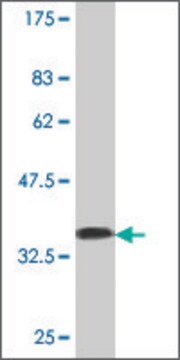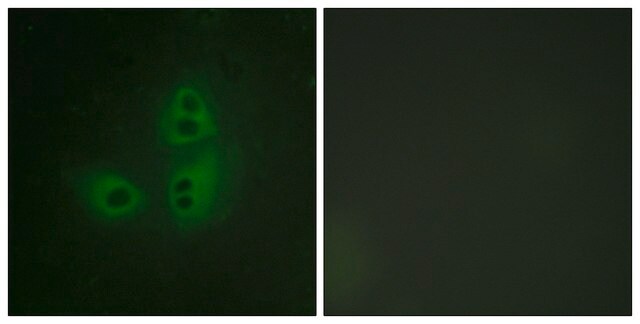AB143
Anti-Choline Acetyltransferase Antibody
CHEMICON®, rabbit polyclonal
Synonym(s):
Choline acetylase, acetyl CoA:choline O-acetyltransferase, choline acetyltransferase
About This Item
IP
WB
immunoprecipitation (IP): suitable
western blot: suitable
Recommended Products
Product Name
Anti-Choline Acetyltransferase (ChAT) Antibody, serum, Chemicon®
biological source
rabbit
Quality Level
antibody form
serum
antibody product type
primary antibodies
clone
polyclonal
species reactivity
mouse, human, feline, bat, rat, monkey
manufacturer/tradename
Chemicon®
technique(s)
immunohistochemistry (formalin-fixed, paraffin-embedded sections): suitable
immunoprecipitation (IP): suitable
western blot: suitable
NCBI accession no.
UniProt accession no.
shipped in
dry ice
target post-translational modification
unmodified
Gene Information
cat ... Chat(751512)
human ... CHAT(1103)
mouse ... Chat(12647)
rat ... Chat(290567)
rhesus monkey ... Chat(709977)
General description
Specificity
Application
1:200 dilution of a previous lot immunoprecipitated 68 kDa active ChAT from brain and placenta. Also precipitates a 27 kDa protein that is co-expressed with ChAT (but lacking ChAT activity) in some cholinergic neurons of the central nervous system of Humans and possibly other mammals.
Optimal working dilutions and protocls must be determined by end user.
Quality
Immunohistochemistry (Paraffin) Analysis:
ChAT (cat. # AB143) staining on normal cerebral cortex. Tissue treated with no antigen retrieval. The antibody was diluted to 1:100, using IHC-Select Detection with HRP-DAB. Immunoreactivity is seeing as a staining pattern on the cell body, dendrites and axons of neurons (brown).
Physical form
Analysis Note
Cerebral cortex tissue.
Other Notes
Legal Information
Not finding the right product?
Try our Product Selector Tool.
Storage Class Code
10 - Combustible liquids
WGK
WGK 1
Flash Point(F)
Not applicable
Flash Point(C)
Not applicable
Certificates of Analysis (COA)
Search for Certificates of Analysis (COA) by entering the products Lot/Batch Number. Lot and Batch Numbers can be found on a product’s label following the words ‘Lot’ or ‘Batch’.
Already Own This Product?
Find documentation for the products that you have recently purchased in the Document Library.
Customers Also Viewed
Our team of scientists has experience in all areas of research including Life Science, Material Science, Chemical Synthesis, Chromatography, Analytical and many others.
Contact Technical Service












